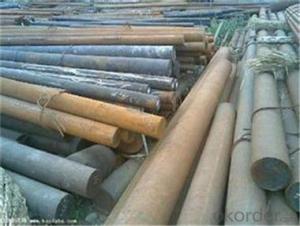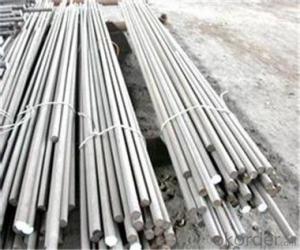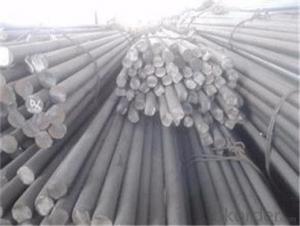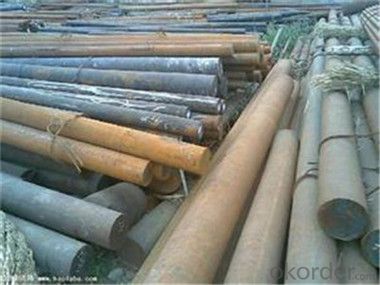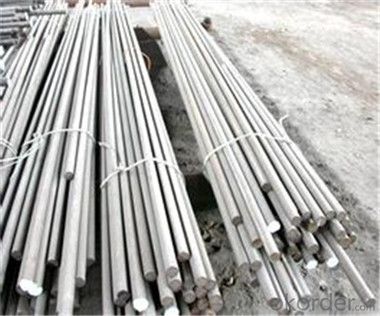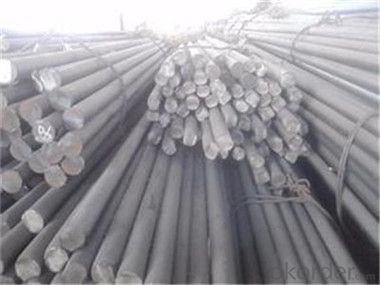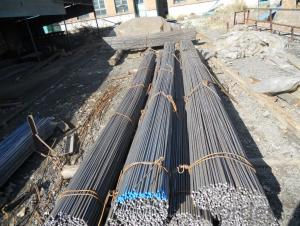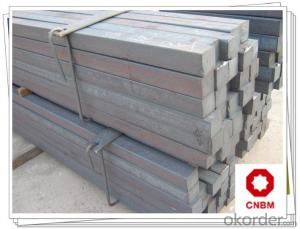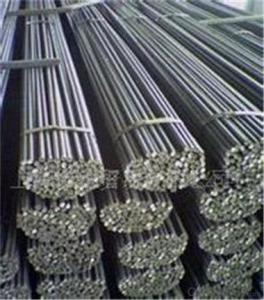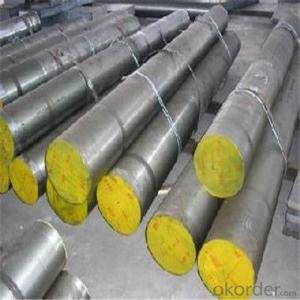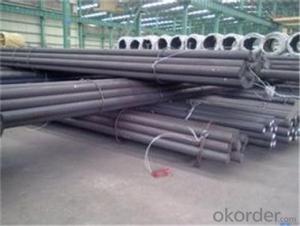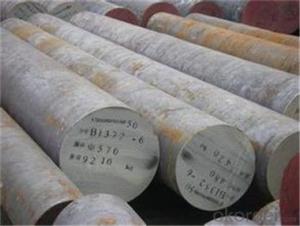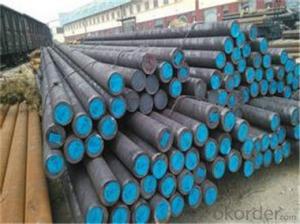HSS Steel Round Bar/High Alloy Round Tool Steel Bar/M2/M25M42/D2
- Loading Port:
- Tianjin
- Payment Terms:
- TT OR LC
- Min Order Qty:
- 77 m.t.
- Supply Capability:
- 2000000 m.t./month
OKorder Service Pledge
OKorder Financial Service
You Might Also Like
Description of steel round bar:
Characteristic:Tungsten-molybdenum high speed steel developed by China,high performance in toughness ,hardness, high temperature hardness.Carbon steel rod applies to chemical industry, shipping industry,manufacturing industry,construction,decorate Industry,electric power,pump shafts, sanitary wares,furniture handles,boiler,high temperature resistant,low temperature resistant, corrosion resistant.
Festures of steel round bar:
Anneal temperature: 840-860
Relief annealing temperature: 720-760
Hardening temperature: 1210-1230
Hardening medium: salt bath under 600,aslo use oil cooling or air cooling
Specifications of steel round bar:
| C | Si | Mn | W | Mo | Cr | V | P | S |
| 0.80-0.90 | 0.20-0.45 | 0.15-0.40 | 5.50-6.75 | 4.50-5.50 | 3.80-4.40 | 1.75-2.20 | ≤0.030 | ≤0.030 |
Images of steel round bar:
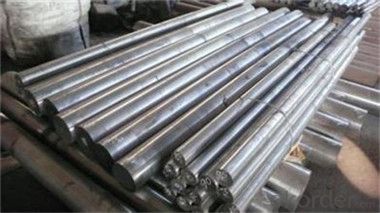
FAQ:
1. What is your package?
Packing situation: standard seaworthy packing or as customer required.
2. How long is the lead time?
Delivery time: 45 days after order confirmed.
3. What payment term do you accept?
Payment: T/T or L/C at sight.
- Q: Can steel round bars be used in the manufacturing of bearings?
- Typically, steel round bars are not utilized in the production of bearings. Bearings necessitate materials with distinct qualities, such as exceptional strength, hardness, and resistance to wear. Steel round bars may not possess these attributes to the necessary extent. Instead, bearings are usually crafted from top-notch steel alloys that are specifically engineered for bearing purposes, such as bearing steel or stainless steel. These materials undergo specialized heat treatment procedures to attain the desired properties essential for bearing manufacturing, including the ability to bear heavy loads, minimal friction, and long-lasting endurance.
- Q: How are steel round bars used in the construction of railways?
- Steel round bars are commonly used in the construction of railways due to their durability and strength. These bars are usually made of high-quality steel, which makes them resistant to wear and tear caused by heavy loads and constant use. In the construction of railways, steel round bars are primarily used for reinforcement purposes. They are often installed as reinforcement rods within the concrete sleepers or ties that support the railway tracks. These bars provide additional strength and stability to the sleepers, enhancing the overall structural integrity of the railway system. Moreover, steel round bars are also used for the construction of railway bridges and tunnels. These bars can be utilized to reinforce the concrete structures, ensuring that they can withstand the weight of trains and other loads passing over them. Additionally, steel round bars are employed in the fabrication of various railway components, such as rail fastenings, switch points, and signaling equipment. These bars are molded into specific shapes and sizes to meet the required specifications of these components. The high strength and flexibility of steel round bars make them ideal for these applications, as they can withstand the forces and stresses exerted on the railway infrastructure. In summary, steel round bars play a crucial role in the construction of railways by providing reinforcement, strength, and stability to the various components and structures. Their durability and reliability make them an essential material in ensuring the safety and longevity of railway systems.
- Q: Are steel round bars available in custom sizes?
- Indeed, one can find steel round bars in custom sizes. Steel manufacturers and suppliers have the capability to produce round bars according to precise size demands and specifications. It is possible to make requests for custom sizes based on the diameter, length, and overall dimensions of the round bar. Whether it is for a particular project or application, numerous steel manufacturers and suppliers provide the opportunity to tailor the size of round bars to cater to individual requirements.
- Q: Can steel round bars be used for making shock absorber components?
- Absolutely! When it comes to constructing shock absorber components, steel round bars are a fantastic choice. The reason being, steel possesses exceptional qualities including robustness, longevity, and the ability to withstand wear and tear. By utilizing steel round bars, it becomes possible to craft a multitude of shock absorber elements, including piston rods, mounting brackets, and tube bodies, through either machining or forging methods. The incorporation of steel guarantees that these components can endure the immense pressures and forces linked to shock absorption, thereby ensuring vehicle stability and seamless functionality.
- Q: What are the advantages of using weather-resistant steel round bars?
- Weather-resistant steel round bars have numerous benefits. Firstly, they are specifically designed to withstand harsh weather conditions, such as corrosion, rust, and degradation caused by rain, snow, humidity, and saltwater environments. This makes them ideal for outdoor applications like construction projects, marine structures, and coastal infrastructure. Secondly, weather-resistant steel round bars eliminate the need for extra protective coatings or treatments. Unlike regular steel, which requires frequent maintenance and painting to prevent rust and corrosion, these bars develop a natural protective layer called patina. This patina acts as a barrier against further corrosion, reducing maintenance requirements and extending the material's lifespan. Thirdly, these bars offer exceptional strength and durability. They are manufactured with a special alloy composition that enhances their mechanical properties, making them highly resistant to impact, bending, and fatigue. This makes them perfect for structural applications in bridges, building frameworks, and heavy machinery. Additionally, weather-resistant steel round bars have aesthetic advantages. The unique patina that forms on their surface gives them an attractive reddish-brown color, adding a visually appealing element to architectural and design purposes. Lastly, the use of weather-resistant steel round bars contributes to sustainability and cost-effectiveness. Their long lifespan and low maintenance requirements make them a more sustainable option compared to traditional steel. While the initial investment may be higher, the long-term savings in maintenance and replacement costs make them a cost-effective choice in the long run. In conclusion, the benefits of using weather-resistant steel round bars include their ability to withstand harsh weather conditions, eliminate the need for additional protective coatings, provide exceptional strength and durability, offer aesthetic appeal, and contribute to sustainability and cost-effectiveness.
- Q: How do you store excess steel round bars?
- To store excess steel round bars, it is important to follow certain guidelines to ensure their longevity and prevent any damage. Here are a few steps you can take: 1. Properly clean and inspect the steel round bars before storage. Remove any dirt, grease, or moisture from the surface to prevent corrosion. 2. Choose an appropriate storage location. Ideally, it should be a dry, well-ventilated area with stable temperatures. Avoid storing the bars in areas prone to moisture, extreme heat, or direct sunlight. 3. Use racks or pallets to store the bars. Stack them horizontally, one on top of another, with enough space between each layer to prevent deformation or bending. 4. If storing the bars outdoors, cover them with a waterproof tarp or protective coating to shield them from rain, snow, and other elements. 5. Avoid placing excessive weight on top of the bars to prevent deformation. Be mindful of any sharp objects or edges nearby that could cause damage. 6. Regularly inspect the stored bars to ensure no signs of corrosion, rust, or other damage. If any issues are detected, take the necessary steps to address them promptly. Remember, proper storage is crucial to preserve the quality and integrity of the steel round bars. By following these guidelines, you can ensure that your excess steel round bars remain in good condition until they are needed for future use.
- Q: How is a steel round bar made?
- A steel round bar is made through a process called hot rolling, which involves heating a steel billet to high temperatures and then passing it through a series of rollers to shape it into a round bar. This process helps to improve the mechanical properties and surface finish of the steel bar, making it suitable for various applications in industries such as construction, manufacturing, and engineering.
- Q: What is the difference between a cold-drawn and a polished steel round bar?
- A cold-drawn steel round bar and a polished steel round bar differ in their manufacturing processes and resulting properties. A cold-drawn steel round bar is produced by pulling or drawing a hot-rolled steel bar through a die or series of dies to reduce its diameter and increase its length. This process is done at room temperature, which imparts certain characteristics to the steel. Cold-drawn steel bars have a smooth and shiny surface, with tight dimensional tolerances and improved mechanical properties. The cold drawing process refines the microstructure of the steel, making it stronger, more uniform, and less prone to defects. These bars are commonly used in applications that require high strength, precision, and resistance to fatigue, such as automotive components, machinery, and tooling. On the other hand, a polished steel round bar undergoes a different treatment process. After the steel bar is formed, it goes through polishing, which involves grinding or buffing the surface to achieve a smooth and reflective finish. Polished steel bars have a shiny and mirror-like appearance due to the removal of surface imperfections and contaminants. This process is primarily done for aesthetic purposes and does not significantly alter the mechanical properties of the steel. Polished steel round bars are commonly used in decorative applications, architectural designs, and furniture. In summary, the main difference between a cold-drawn and a polished steel round bar lies in their manufacturing processes and intended applications. Cold-drawn bars undergo a precise cold drawing process to improve their mechanical properties, while polished bars are subjected to surface polishing for an aesthetically pleasing finish.
- Q: Can steel round bars be used in the production of valves?
- Valves can indeed utilize steel round bars during their production. The utilization of steel round bars typically occurs when forming the primary structure or stem of the valve. The circular form of the bar facilitates uncomplicated machining and molding into the desired valve constituent. Steel, renowned for its robustness and endurance, emerges as an optimal selection for valves, as they necessitate the capacity to withstand elevated pressures and temperatures. Furthermore, steel lends itself to effortless welding, permitting the affixation of additional valve components like flanges or fittings. To summarize, steel round bars furnish the essential potency and adaptability requisite for valve manufacturing.
- Q: What are the maximum allowable stresses for steel round bars?
- The maximum allowable stresses for steel round bars depend on various factors such as the grade of steel, the type of loading, and the design code being followed. In general, the maximum allowable stress for steel round bars is determined by the yield strength of the steel. The yield strength is the stress at which permanent deformation or yielding of the material occurs. Different grades of steel have different yield strengths. For example, mild steel typically has a yield strength of around 250 MPa (megapascals), while high-strength low-alloy (HSLA) steel can have a yield strength of up to 550 MPa. To determine the maximum allowable stress, typically a safety factor is applied to the yield strength. This safety factor takes into account uncertainties in material properties, loadings, and potential variations in manufacturing processes. The safety factor can vary depending on the application and design code being followed. For example, in structural steel design, the American Institute of Steel Construction (AISC) specifies a safety factor of 1.67 for the yield strength. This means that the maximum allowable stress would be the yield strength divided by 1.67. It is important to consult relevant design codes, standards, or engineering specifications for specific applications to determine the appropriate maximum allowable stresses for steel round bars.
Send your message to us
HSS Steel Round Bar/High Alloy Round Tool Steel Bar/M2/M25M42/D2
- Loading Port:
- Tianjin
- Payment Terms:
- TT OR LC
- Min Order Qty:
- 77 m.t.
- Supply Capability:
- 2000000 m.t./month
OKorder Service Pledge
OKorder Financial Service
Similar products
Hot products
Hot Searches
Related keywords
